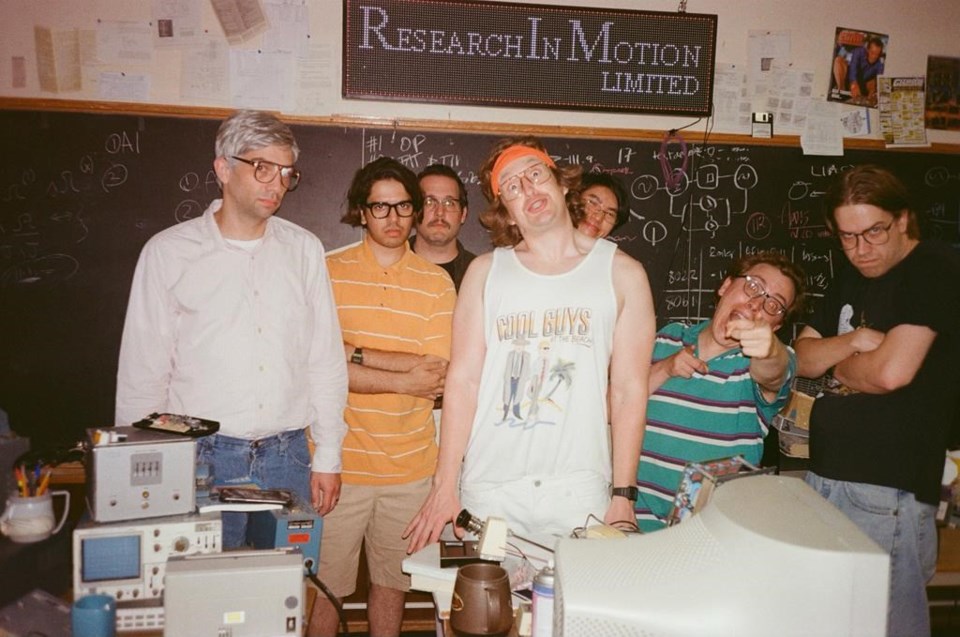TORONTO â When the Canadian filmmakers behind âBlackBerryâ set out to make a feature-length movie about the beloved smartphoneâs meteoric rise and fall, they werenât necessarily interested in getting all the facts right.
Even though their project was named after the Waterloo, Ont., invention that forever changed how we communicate, both the director and co-writer say they were less interested in the device itself than the story of the three men who grew a pocket-sized idea into a gargantuan success.
Director and co-writer Matt Johnson said, unlike other major technology companies that have dominated the conversation in recent years, BlackBerry's history hasn't been told in documentaries or TV miniseries.
The absence of a familiar narrative gave him and his team a "blank slate" to draft their own versions of former co-CEOs Mike Lazaridis and Jim Balsillie.
"We got to get there first in terms of saying who they really were without there being a whole bunch of baggage," Johnson explained in a video chat from Germany where "BlackBerry" premiered at the Berlin International Film Festival last month to positive reviews.
At its heart, "BlackBerry" is a satire that draws on the impossibility of endless growth, the way success can blind us and the quirks of tech-bro workplace culture.
It's also fast and loose with many historical details.
Johnson previously applied his off-kilter comedic sensibilities to his acclaimed and surreal TV series "Nirvanna the Band the Show" and his mockumentary "Operation Avalanche," about CIA agents who infiltrate NASA.
He brings a similar wackadoodle approach to "BlackBerry," although the story is loosely guided by the 2015 book "Losing the Signal: The Untold Story Behind the Extraordinary Rise and Spectacular Fall of BlackBerry," from Globe and Mail reporters Sean Silcoff and Jacquie McNish.
Some lines are pulled straight from the book, Johnson said. Other ideas came from conversations he had with former employees and personal diaries and photo journals they shared.
The film begins in the mid-1990s, more than a decade after BlackBerry-maker Research In Motion was founded and just as RIM's concept for a smartphone began to take shape.
It ends around 2007 just after Apple's iPhone debuts and as Balsillie is tangled in distractions, including multiple failed attempts to buy a National Hockey League team.
Left out of the movie are the many blunders of the early 2010s, among them the failure of the PlayBook tablet, a clash of leadership over the company's direction, and the arrival of the BlackBerry 10 phones, which were meant to return the company to its glory days.
Before they started production, neither Johnson nor co-writer Matthew Miller was particularly familiar with the smartphone's history or its top leaders.
âI never owned a BlackBerry,â said the 37-year-old Johnson, adding they were also largely unfamiliar with the RIM execs in the film.
âIt was only when we realized how similar their lives were to our own lives that we discovered the cinematic arc.â
The three executives at the film's core â Lazaridis, Balsillie and RIM co-founder Doug Fregin â are a blend of research, assumptions and pure imagination, said Johnson.
RIM co-founder Lazaridis is played by lanky Jay Baruchel in a grey wig as a meticulous and robotic mastermind who lacks the business savvy and social skills to succeed alone. He's portrayed as a pushover who's often stuck between his extensive knowledge and the pressure put on him by co-founder and pal Fregin.
Glenn Howerton of âItâs Always Sunny in Philadelphiaâ skates into the film like a foul-mouthed hockey coach for his take on staunch businessman Jim Balsillie, a performance that leans heavily into the real-life executive's take-no-prisoners reputation.
Howerton's Balsillie has a short fuse, is verbally abusive and has no qualms about smashing a landline phone or two when heâs on the losing end of a conversation. Fragments of his character were inspired by journalistic pieces about Balsillie, including one in Maclean's magazine that chronicled his failed hockey bids, the filmmakers noted.
"We really have those sports journalists to thank because they were the people who paved the way for that character to find life," Johnson said.
Added the 42-year-old Miller: "Compared to what my perception was of the guy before we started working on this versus how he comes off in the film, it's almost gentle."
Rounding out the trio is Fregin, the most mysterious of the three in real life. The film version is played by director Johnson, who incorporated stories shared by former RIM employees into a composite character.
The Fregin here wears a red bandana in the style of a kung fu hero, sports a "Doom" video game shirt, and spits lines from âThe Breakfast Club.â He organizes regular movie nights to unwind in the BlackBerry offices, which are decorated with posters of Hollywood hits like "Serpico" and "Point Break."
Johnson acknowledged that the pop-culture references may not connect with strict BlackBerry historians, but he says those small details convey the motivation behind each character's drive.
âMy feeling growing up was that people who are really into sci-fi stuff â who read âDune,â who are interested in other worlds â wind up taking their cultural obsessions and creating those things as products for the masses,â he explained.
Johnson said he believes technologists often âget misrepresented as sniffling dweebsâ or âsocially inept losers,â in the vein of the 1984 comedy âRevenge of the Nerdsâ or the television sitcom âThe Big Bang Theory.â He wanted to paint them with more nuance.
Added Miller: "In no way did we feel pressure to get things a certain way. What we wanted to do was make something that we really thought was awesome.â
"BlackBerry" hits Canadian theatres on May 12. It screens next at the South By Southwest Film Festival in Austin, Tx. on March 13.
This report by The Canadian Press was first published March 7, 2023.
David Friend, The Canadian Press



